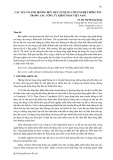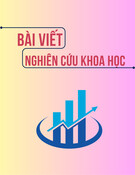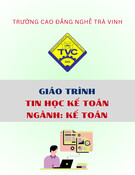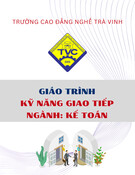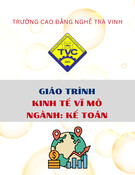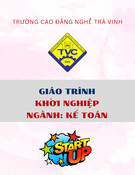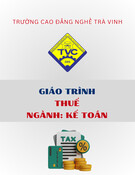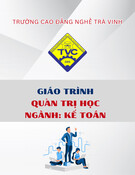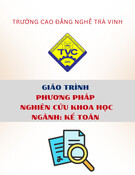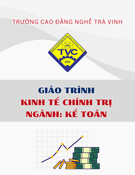
P-ISSN 1859-3585 E-ISSN 2615-9619 https://jst-haui.vn ECONOMICS - SOCIETY Vol. 60 - No. 11E (Nov 2024) HaUI Journal of Science and Technology
35
THE IMPACT OF CYBER FORENSIC ACCOUNTING ON QUALITY OF METAVERSE INTEGRATED REPORTING QUALITY IN METAVERSE LOCAL GOVERNMENT
Pham Quang Huy1,*, Vu Kien Phuc2 DOI: http://doi.org/10.57001/huih5804.2024.341 ABSTRACT
The main aim of this study is to delve into the impact of cyber forensic
accounting on the quality of metaverse integrated reporting in metaverse
local government. The
suggested model was empirically validated using
SmartPLS 4.1.0.2 software and structural equation modelling. Statistical data
obtained from surveys conducted among accountants working in public sector
organizations (PSOs). The conducted result analyses rev
ealed strong and
statistically significant associations between the hypothesized constructs in
terms of the size of their effects. Specifically, within the realm of cyber forensic
accounting, the quality of metaverse integrated reporting was influenced the
most by digitally designed forensic procedures and zero trust governance, as
indicated by the highest path coefficient. In contrast, cyber anti-
fraud policies
showed the lowest path coefficient. In addition, the enhanced insights offered
in this work not
only provide a strong basis for future investigations, but also
have the potential to help policymakers and practitioners identify and take
advantage of opportunities to enhance and broaden the quality of metaverse
integrated reporting. Keywords: Forensic accounting, integrated reporting, local government. 1University of Economics Ho Chi Minh City (UEH), Vietnam 2University of Economics Ho Chi Minh City (UEH), Vinh Long Campus, Vietnam*Email: pquanghuy@ueh.edu.vn Received: 19/5/2024 Revised: 28/7/2024 Accepted: 28/11/2024 1. INTRODUCTION AND CONTEXT The implementation of digital concepts and information and communication technologies has significantly altered the manner in which public services are provided [1]. In light of the ongoing public expectation for enhanced transparency, effectiveness, and agility from governmental entities [1, 2], citizens expect their representatives to explore novel prospects and concepts that contribute to the development of sustainable, environmentally friendly, and expedient digital public services [3]. Government regulations frequently impose distinctive criteria on technology usage, such as the necessity to ensure universal access, promote transparency, and ensure accountability. Citizen-public organization interactions may be improved through the implementation of the metaverse, which appears to be a promising digital concept [4, 5]. The increased accessibility of the metaverse to the general public is facilitated by advancements in hardware capabilities and performance, computational efficiency, content availability, and the emphasis placed on this by scientific and governmental organizations [5]. A number of governmental bodies have expressed their intention to incorporate metaverse services into their e-government and smart city initiatives [3, 5]. As suggested by [6], integrated reporting can substantially improve the disclosure of Sustainable Development Goals by providing the framework, strategy, and resources required to convert these objectives into quantifiable business initiatives. The integration of sustainable development principles into a range of international and regional initiatives has facilitated the transformation of society, the reorganization of markets, the prioritization of information technology progress, and social systems [7]. Simultaneously, the progression of Industry 4.0 is causing a profound revolution in business operations and communications across all sectors and levels [8]. As a consequence, there is a notable surge in innovation and a deeper integration of digital technologies into everyday existence [9]. Metaverse integrated reporting has been identified as the most suitable form of organizational reporting that empowers local governments to address

ECONOMICS - SOCIETY https://jst-haui.vn HaUI Journal of Science and Technology Vol. 60 - No. 11E (Nov 2024)
36
P
-
ISSN 1859
-
3585
E
-
ISSN 2615
-
961
9
the growing expectations of stakeholders amidst the swift advancement of digital technologies in the public sector organizations (PSOs). Integrated reporting has undergone significant development in the academic literature as a method of executing regulatory policy. Nevertheless, research has shown that compliance and conformity, not commitment and engagement, are the driving forces behind integrated reporting disclosures [10]. This implies that the disclosures included in integrated reporting fail to offer the relevant informational value that is desired by different stakeholders. In this regard, the importance of the quality of integrated reporting exceeds that of its standard implementation [11]. Preventing the manipulation of integrated reporting for the purpose of greenwashing by management by presenting superfluous and overly detailed information is accomplished by ensuring its quality [12]. Although ensuring the disclosure of high-quality data is more crucial than disclosing large quantities [13], there is a scarcity of academic papers that explicitly examine this aspect [14]. A notable area of scholarly inquiry in the literature is the development and enhancement of integrated reporting quality, an area that is attracting increasing attention. Presently, both policymakers and academics are encouraged to undertake purposeful inquiry and cultivate a substantial comprehension of this subject. Numerous scholarly proposals have been advanced concerning integrated reporting. These include the following: the participation of the audit committee and the engagement of auditors [15] and the participation of the chief executive officer [16] and so on. While numerous academic investigations have explored the ways in which forensic accounting enhances the quality of financial reporting (e.g., [17, 18]), the extent to which cyber forensic accounting can improve the quality of integrated reporting, especially quality of metaverse integrated reporting (QMIR) has yet to be extensively explored. Given the circumstances, it is critical to reassess existing accounting methods, acquire a more comprehensive comprehension of contemporary accounting principles, leverage the capabilities of metaverse integrated reporting, and ensure high quality of public service provided. The opportunities for both theoretical and practical contributions and the primary motivations for conducting this research stem from the absence of a solid academic foundation regarding the potential role of cyber forensic accounting in advancing QMIR. Furthermore, the contribution of cyber forensic accounting to QMIR will be investigated in this study. The subsequent intriguing research questions are further motivated by this lacuna in theory. RQ1. Does each component of cyber forensic accounting affect QMIR? RQ2. How far does each component of cyber forensic accounting affect QMIR? The existing knowledge vacuum in the literature on integrated reporting, which has been predominantly investigated by the private sector, was filled by the findings of this study, thereby expanding the current boundaries of understanding. The insights gained from this study would broaden the perspectives of scholars regarding the integration of reporting systems in the metaverse for local governments. This study establishes a precedent for research in developing nations regarding the relationship between cyber forensic accounting and QMIR as conducted by local governments. The current research contributes to the expanding corpus of literature concerning digital forensic accounting, as evidenced by the works of [19]. Expertise-level insights on the acquired findings would undeniably benefit practitioners, as they would provide guidance on how to identify and capitalize on opportunities for growth facilitated by digital technology. Practically speaking, practitioners would be able to improve not only the overall performance of local governments but also the quality of public services they deliver if there were greater recognition and comprehension of the extent to which the metaverse is being implemented. Furthermore, it was noted that practitioners should prioritize increasing their focus on cyber forensic accounting, as doing so would effectively leverage the implementation of a more comprehensive solution. This would also enable local governments to achieve high-quality metaverse integrated reporting. Additionally, government policymakers and influencers were urged to prioritize innovative characteristics and ensure a conducive environment for innovation deployment by introducing policies that would facilitate the application of digital technologies and incentivize and promote the implementation of advanced accounting practices based on the metaverse. With the exception of the introduction, this study proceeds as follows. A concise overview of the theoretical foundation and literature review can be found in Section

P-ISSN 1859-3585 E-ISSN 2615-9619 https://jst-haui.vn ECONOMICS - SOCIETY Vol. 60 - No. 11E (Nov 2024) HaUI Journal of Science and Technology
37
2. Subsequently, Section 3 delves into the intricacies of hypothesis development and research model formulation. The detailed description of the research approach utilized in this study can be found in Section 4. In Section 5, the precise results of the explanatory sequential design are described in detail. Subsequently, this research is concluded in Section 6, which also delineates the prospective orientations for forthcoming scholarly publications. 2. LITERATURE REVIEW 2.1. Theoretical underpinning Contingency theory. The contingency theory is supposed to be particularly pertinent as it suggests that there is no universally ideal accounting system that can be applied to all organizations in all situations [20]. The core principle of contingency theory is the alignment between an organization's utilization of accounting information systems and crucial aspects of the organizational setting. The efficiency of using an accounting information system depends on internal elements within an organization, such as its ability to innovate, as well as external factors like technical developments in the environment. One potential solution for the achievement of high-quality integrated reporting could be the implementation of cyber forensic accounting [21]. Thus, the efficacy of cyber forensic accounting relies on the efficient and successful execution of each of its basic elements [21]. Stakeholder theory. A multitude of stakeholders, including shareholders, employees, clients, financiers, political organizations, and others, were interested in the operations of an organization. These stakeholders frequently exerted pressure on organizations to adhere to societal norms of ethics and regulation [22]. Incorporating the viewpoints of [23], stakeholder theory provided organizations with a novel perspective on their comprehensive obligations. Therefore, the stakeholder theory was the preeminent framework in organizational sustainable development, as stated by [24]. The distribution of integrated reporting information that is both reliable and valuable is a response to the demands of stakeholders and a means of fostering their trust in the organization [25]. 2.2. Conceptual respects Metaverse. The term "metaverse" emerged in computer science literature in the 1990s, namely in relation to advancements in interactive virtual worlds, real-time autonomous agents, and research on virtual humans [26]. The term "Metaverse" was a combination of the words "meta" and "universe." It described a virtual environment that exists in three dimensions, where avatars participate in various activities related to politics, economics, society, and culture [27]. Study [28] defined the metaverse as an enthralling virtual realm in which users congregated to exchange experiences and participated in instantaneous exchanges within simulated settings. The metaverse was becoming a tangible reality, thanks to recent advancements in new technologies like extended reality, artificial intelligence, and blockchain [4]. Metaverse local government. Based on the perspectives of [29], the local government could be understood as a public entity that was empowered to create and implement public policies within a certain area. However, it was important to note that the local government is a subdivision of the central government. Local government, as proposed by [30], was specified as the level of government where local authorities are legally empowered to enact laws or make decisions that control their jurisdiction. According to [31], local government was a component of a country's governance that specifically addresses the challenges and concerns related to the population residing in a particular region or location. While [32] argued that digital government was the utilization of information technology to facilitate government operations, involve the public, and deliver services, [33] advocated that digital government was identified as the application of information and communication technologies to governance. Although digital transformation initiatives in the PSOs extend beyond the simple digitization or digitalization of pre-existing offline processes, scholars in this domain also aim to deploy the most optimal and efficient digital technologies to ensure the delivery of high-quality public services. In this regard, Metaverse local government has developed novel digital strategies in order to address political, economic, social, and other pressures. The term "Metaverse local government" in this context is used to describe the creation and distribution of local government-related and public-facing information and services through the Metaverse. The advent of new paradigm-shifting technologies has empowered governments to deliver more personalized public services to citizens, simulate and forecast intricate

ECONOMICS - SOCIETY https://jst-haui.vn HaUI Journal of Science and Technology Vol. 60 - No. 11E (Nov 2024)
38
P
-
ISSN 1859
-
3585
E
-
ISSN 2615
-
961
9
systems encompassing the private sector of entire nations and military operations with enhanced precision. Metaverse integrated reporting. Integrated reporting's concurrent reporting and reasoning process may be essential for fostering novel perspectives on reporting and decision-making [34]. Integrated reporting is a form of organizational reporting that aims to consolidate financial and non-financial data in order to provide a holistic understanding of the processes by which an organization creates, maintains, and exhausts value for various stakeholders [35]. By integrating the appropriate integrated reporting framework into their metaverse platform, organizations are engaging in metaverse integrated reporting with the intention of delivering high-quality integrated reporting information to stakeholders. Cyber forensic accounting. Forensic accounting, as described by [36], is the utilization of accounting knowledge to examine cases of fraud, embezzlement, and other types of financial wrongdoing. Furthermore, it entails the gathering of non-monetary data related to an organization. Cybercriminals leverage vast quantities of data, posing challenges in extracting pertinent information and discerning trends. [37] defined cyber forensic accounting as the utilization of forensic accounting principles to investigate and deter cybercrimes. 3. HYPOTHESIS DEVELOPMENT As a result of the proliferation of threats brought about by the rapid implementation of information and communication technologies throughout the COVID-19 pandemic, the number of threats has increased. This is due to implementation process vulnerabilities, which facilitate the attacks. A significant increase in cyber-fraud and identity theft has ensued as a consequence of this circumstance [38]. Accounting, notwithstanding its stringent security measures and legal oversight, is a recurring target of fraudulent activities [39]. Policies against cyber fraud are crucial for preventing fraudulent activities. In addition to facilitating the evaluation of risks and the reduction of instances of financial misconduct in local governments, these policies are also flexible enough to accommodate the current economic climate. The adherence to this standard will guarantee accountants' professional skepticism and autonomy. Moreover, it ensures that financial institutions maintain strict compliance with internal management and reporting protocols, both of which are critical in the fight against financial fraud. Given these circumstances, the first hypothesis that informs the current research is as follows. Hypothesis 1 (H1). Cyber anti-fraud policies significantly and positively influence QMIR. The zero-trust model, as described by [40], is a strategic cybersecurity approach that aims to protect organizations through the elimination of implicit trust and the continuous verification of every stage of their digital interactions. Organizational governance comprises a structured system of regulations, standards, and procedures that govern the supervision and control of the activities and decision-making procedures of an organization. While ensuring ethical, accountable, and responsible operations, the organization seeks to create long-term value for all of its stakeholders. Particularly with regard to zero-trust security, zero-trust governance comprises a collection of principles, protocols, and procedures that govern the direction and management of an organization. This involves guaranteeing that the organization complies with responsible and ethical practices and meets all obligations to stakeholders. Given these circumstances, the second hypothesis that informs the current research is as follows. Hypothesis 2 (H2). Zero trust governance significantly and positively influences QMIR. Cyberspace is a virtual domain that may be entered by anybody with Internet access, without the requirement of physical contact. When using the internet, people are at risk of being targeted by cybercriminals. The objective of digital forensic methods is to collect, analyze, and protect digital evidence. A digitally designed forensic procedure comprises several sequential procedures to ensure the authenticity and reliability of digital forensic evidence and to establish a transparent record of custody during administrative, disciplinary, and judicial proceedings [41]. Given these circumstances, the third hypothesis that informs the current research is as follows. Hypothesis 3 (H3). Digitally designed forensic procedures significantly and positively influences QMIR. Fig. 1. Conceptual model

P-ISSN 1859-3585 E-ISSN 2615-9619 https://jst-haui.vn ECONOMICS - SOCIETY Vol. 60 - No. 11E (Nov 2024) HaUI Journal of Science and Technology
39
4. MATERIALS AND METHOD 4.1. Measurement scale In the beginning, 15 experts, including chief accountants and leaders of PSOs, as well as university lecturers, participated in semi-structured interviews to provide their firsthand knowledge and perspectives on forensic accounting, cyber security, integrated reporting, and metaverse implementation. The professionals imparted valuable insights pertaining to forensic accounting, cyber security, integrated reporting, and the implementation of the metaverse via comprehensive discussions. The attributes gleaned from the thematic content analysis of these interviews were crucial in formulating the questionnaire items for each variable in the proposed model. The interview data and existing literature were utilized to derive the attributes pertaining to the quality of metaverse integrated reporting. Conversely, the attributes utilized for cyber forensic accounting were obtained and verified from well-established instruments documented in the literature. Thirty participants participated in a pilot study to ascertain the instrument's validity and reliability. As a result of the pilot study's finding that all variables possessed an appropriate reliability of greater than 0.6, the survey remained unchanged. Cyber forensic accounting. The primary framework for evaluating cyber forensic accounting consists of four secondary frameworks namely cyber anti-fraud rules, zero-trust governance, and digitally developed forensic procedures. The measurement scale for cyber anti-fraud policies was primarily rested on the criteria obtained from the research conducted by [37] and [42]. The zero-trust governance measuring scale was established according to criteria obtained from the research findings of [43]. The measurement scale used for digitally constructed forensic methods was established according to the criteria developed by [41]. Quality of metaverse integrated reporting. Financial affairs and adherence to standards have been common topics covered in public sector reports [44]. This included an evaluation of the efficient use of financial resources and the satisfaction of internal stakeholders' requirements. The accurate and timely computation and disclosure of these indicators are fundamental elements of public responsibility. A comparative analysis of the qualitative characteristics of private and PSO financial reports by [45] revealed that accounting regulations were remarkably similar. Particularly, the PSO's conceptual framework is comparable to that of the private sector in terms of a number of qualitative characteristics, including applicability, timeliness, comprehensibility, consistency, verifiability, and comparability. The format and content of the financial and budgetary reporting statements that PSOs in Vietnam prepared and disclosed were significantly altered as a result of the adoption of new accounting regimes and principles. The aforementioned adjustments were consistent with the general approach taken by public administrative agencies in Vietnam, which sought to harmonize their functioning with that of domestic businesses. In this study, the overall quality of metaverse integrated reporting was assessed as a higher-level amalgamation of three fundamental constructs: verifiability, faithful representation, and timeliness and stakeholder engagement. These constructs were derived from the recommendations put forth by [45] as well as [46]. 4.2. Target population and data collection There was no need to conduct a thorough ethical analysis for this study because the data collected was based solely on the opinions of informants. In our research, all participants willingly and knowingly gave their informed consent before taking part. Participants were informed in detail about the study's goals, data usage, and the fact that they might withdraw from the study at any moment without penalty. Specific protocols were established to manage the collected data in order to guarantee its secrecy. In order to ensure the participants' privacy, we deleted or anonymized all personal identifiers. Only researchers who had been approved had access to the data, which were stored securely. The collected data was used exclusively for academic and research purposes pertaining to this publication. Participants in this study were Vietnamese PSO employees working in the accounting and information technology departments. To be eligible to participate, individuals had to meet three conditions: (i) they needed to be working in a PSO at the moment; (ii) they needed to have worked for at least five years; and (iii) they needed to be willing to take part in the study. Those who were approached about participating in the study were later deemed ineligible and removed from further consideration. For the current investigation, snowball and convenience sampling techniques were employed in conjunction. The methodology employed to collect data from the general population for the purpose of deriving statistical conclusions was deemed satisfactory.




